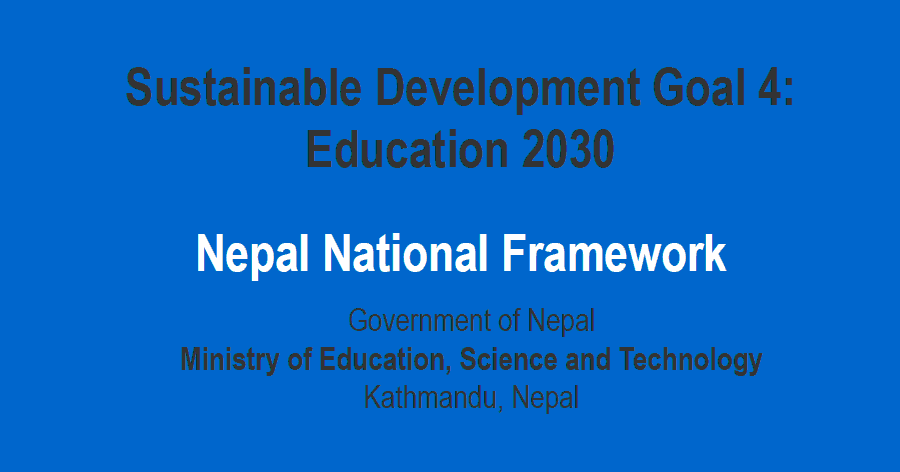
Sustainable Development Goal 4 - Education 2030 Nepal National Framework:
Executive Summary:
Nepal recognizes education as a prerequisite for developing human capital. The foundation of education builds on social, cultural, economic, and physical infrastructures. Education plays a catalytic role in realizing the country’s plan to achieve a developing country status by 2022, become a middle-income country by 2030, and actualize the long-term vision of Prosperous Nepal, Happy Nepali by 2043. In recognition of the instrumental role of education, the Constitution of Nepal ensures citizens’ right to education. A strong public education system is the backbone of all the national aspirations and, in this context, the Government has declared the next ten years as the Community School Enabling Decade (CSED), 2019-2028.
Nepal is a signatory of the Incheon Declaration 2015, Sustainable Development Goal 4 (SDG 4), which aims at ‘ ensuring inclusive and equitable quality education and promoting lifelong learning opportunities for all’. Subsequently, Nepal signed the Agenda for Sustainable Development 2030: Transforming our World, the parent document of the SDG 4. The Agenda recognizes the need to focus on achieving this goal as fundamental to the broader agenda for sustainable development.
The country has also recently signed the Education 2030: SAARC Framework for Action for achieving SDG 4. This SDG 4: Nepal National Framework (NNF) has been developed as a national response to contribute to both national vision, and regional and international commitments. In addition, oriental philosophies serve as the foundation for setting Nepal’s agenda of education drawing on local cultures, knowledge systems, history, indigenous skills, and cosmologies.
Following the promulgation of the Constitution of Nepal, the country’s governance structure has been transformed into a federal system, with education becoming a priority of all three levels of Governments; Federal, Province, and Local. In this context, this document has been prepared to transform the education system to meet the spirit of the SDGs in general and SDG 4 in particular.
This Framework follows the long-term vision of the Government of Nepal aiming to achieve inclusive and equitable quality education for all and further reiterates the following fundamental principles in the context of Nepal, which were agreed in Incheon: (i) Education is a fundamental human right and an enabling right; (ii) Education is a public good, of which the state is the duty bearer; (iii) Gender equality is inextricably linked to the right to education for all; and (iv) Ensuring that education is of sufficient quality to lead to relevant, equitable and effective learning outcomes at all levels and in all settings.
Drawing on SDG 4: Education 2030, this Framework equally anticipates to contribute to the development of Early Childhood Education and Development (ECED)/Pre-Primary Education (PPE) promotion of lifelong learning, expansion of Technical and Vocational Education and Skill Development and advancement of higher education.
The objectives of this Framework are to (a) ensure inclusive and equitable access to quality education and promote lifelong learning for all, (b) promote the culture of peace, civic awareness, sustainable behaviour, social harmony and shared values, (c) promote skills learning and entrepreneurship to contribute to improved and sustained livelihoods,
Employability and economic development, (d) strengthen Information, Communication, and Technologies (ICT) application, scientific orientation, innovation and knowledge creation to foster the development of a knowledge-based economy, and (e) strengthen the institutional capacity to enhance the delivery of the education sector.
Given this background, the main agenda of this Framework is to ensure no one leaving behind in attaining the level of learning needed to live, with the aspiration of sustainable development, inclusively, and equality.
Particular attention is given to ensure that places of learning take the lead in wiping out discrimination based on gender, socio-economic status, disability, and caste/ethnicity. It was agreed that no education target will be considered met unless it is met by all. As the population of Nepal is highly diverse, it is equally crucial to intensify efforts to ensure equity in education.
A highly participatory consultative process was adopted while developing this Framework. A number of pertinent suggestions and inputs received from three levels of governments, sectoral federal line ministries, National Planning Commission (NPC), Confederation of Nepal’s Teachers (CNT), teacher communities, parents, students, businesses and industries, experts, academia, CSOs, development partners and other relevant stakeholders while finalizing this Framework. In addition, a series of consultative meetings with the members of the High-Level National Education Commission further rewarded to set the major priories, strategies, and targets of this Framework.
This Framework has identified the targets, key strategies and interventions to be adopted. The implementation strategy of the SDG 4 aims to bring all three levels of governments – Federal, Province, and Local-together in line with the constitutional provision of cooperation, coexistence, and coordination. Thus, this Framework simultaneously guides to Province and Local Governments to develop SDG 4: Implementation Plan at the Province Level and SDG 4: Action Plan at the Local Level.
The Ministry of Education, Science, and Technology (MoEST) will ensure the availability of technical support and indicative guidelines to all Province and Local Governments to develop their respective Implementation Plan and Action Plan. Since the indicators of this Framework are considered as cross-cutting instruments among the different stakeholders, a robust partnership mechanism with communities and the private sector would be instrumental, not only to ensure its effective implementation but also to enhance shared accountability and ownership of SDG 4.


